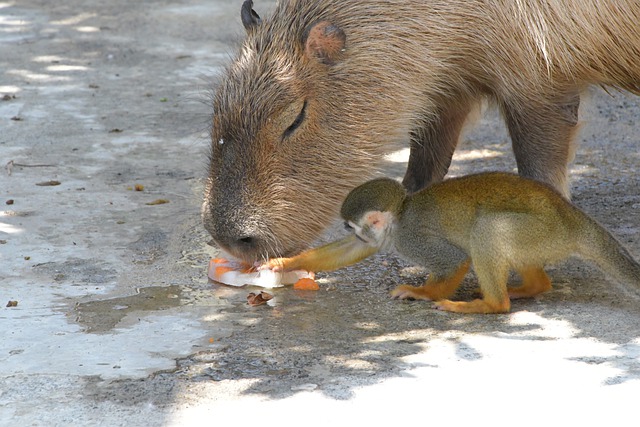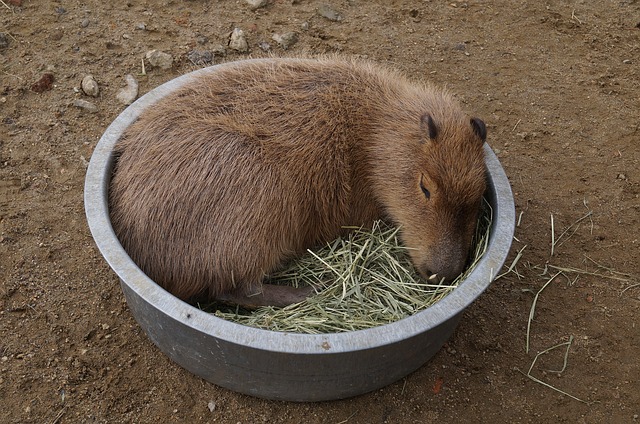Capybaras are not dangerous animals, but they can bite and do a lot of damage with their teeth. Capybaras are herbivores and very chill rodents generally, but they have large incisors that grow continuously throughout their life.
Capybara bites can be very painful because these rodents have large incisors which are sharpened by constant chewing on hard objects such as tree bark. Capybara owners need to pay attention to any signs that their pets may be feeling the need to bite so that they can avoid any incidents from happening in the future!
Capybaras Are Not Dangerous Animals
Capybaras are not aggressive animals. In fact, they’re the opposite of dangerous. The capybara is a herbivore and does not eat meat, so you can rest easy knowing your pet capybara won’t be coming at you with sharp teeth or claws to tear your face off in the middle of the night.

Capybaras Are Not Dangerous Animals
Capybaras are also quite docile creatures that will only bite if provoked or threatened (which is unlikely given their slow-moving nature). They’re great for kids as well because they love being petted and held by humans.
Capybaras Bites
Capybaras are known to be very territorial, and they can bite if they feel threatened. They can do a lot of damage with their teeth and can carry diseases that humans and other animals can catch from them.
Capybaras have sharp teeth that are designed for eating plants, grasses, seeds, fruits and nuts. They also have an impressive jaw muscle for grinding up these foods before swallowing them whole. Capybara jaws work like a vice grip; if you get bitten by one you will know about it!
The capybara has been known to carry leptospirosis – a dangerous bacterial disease that causes fever and headaches in people who come into contact with it through the saliva or urine of infected animals such as rodents or livestock. While not all cases of leptospirosis end in death they are often fatal especially when left untreated so prevention is key here!
Signs of Aggression in Capybara
If a capybara is about to bite, there are a few signs to look out for. One of the most obvious signs is when your capybara begins growling or making an aggressive noise. This can be followed by the capybara standing its ground, which means it won’t back down even if you approach it or try to get up close with it. It’s important not to panic when this happens because these are usually warning signs that your pet is about to bite!
If you notice these behaviors in your pet, do not panic and run away from them; instead try speaking softly while slowly moving backwards away from them until they calm down again.
Capybaras are territorial
Capybaras are extremely territorial and if a capybara feels threatened, it will bite. A capybara may use its teeth as a warning or to show dominance over another animal, especially if it is defending its young.
If you come across a capybara who doesn’t want you around, they will let out an alarm call which warns other members of the group that there is danger present. The other animals will then stand their ground, growl at the intruder and start biting—if this doesn’t work then they will run away from the intruder (if possible). However such an occurrence is not likely to happen.
Capybaras are not dangerous animals. They will bite if they feel threatened, but a capybara can’t do a lot of damage with its teeth in an adult human.
If you’re looking to own one of these rodents as pets or farm animals, it’s important that you know how to spot the signs that indicate when your pet is about to bite so you can avoid getting bitten yourself.
Why Do Capybaras Bite
The most important thing to remember when it comes to avoiding capybara bites is knowing your pet’s temperament. If you know that your pet tends to be aggressive, then you should avoid situations where they feel threatened. Similarly, if you know that your pet is shy and reserved, then you should also avoid situations where they feel threatened or out of their element.
With this in mind, here are some general tips for keeping capybaras from biting:
- Don’t approach or try to touch a capybara that is eating or sleeping (even if it’s an adult). It may not seem like much effort on your part, but these are times when capybaras are at their most vulnerable and could easily mistake any movement as a threat.
- Also avoid approaching young capybara babies with momma nearby; she won’t hesitate before sinking her teeth into someone who approaches her babies uninvited!
- Lastly don’t even think about approaching any adult male during mating season since their hormones can make them especially aggressive during this time period!
Although these rodents aren’t dangerous by nature, you have to know the signs that they are feeling ready to bite.
They’re herbivores and don’t have any natural predators, so you don’t need to worry about them attacking you for food or for fun (although they might try to nibble on some of your toes).

However, capybaras do have sharp teeth, and a bite from one can be very painful. Capybaras have been known to bite people who get too close or try to pick them up (even if they know their owner well), so if you own or work with a capybara make sure that everyone knows how to behave around them so they don’t get hurt.
If you know how to recognize the signs that a capybara is feeling threatened or scared by something in its environment – such as when it has its head turned away from an approaching person or object – then it will be easier for everyone involved!
Avoiding capybara bites is mostly a matter of knowing your pet’s temperament and not putting them in situations where they feel threatened.
